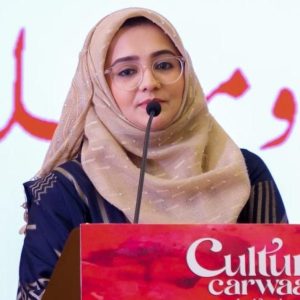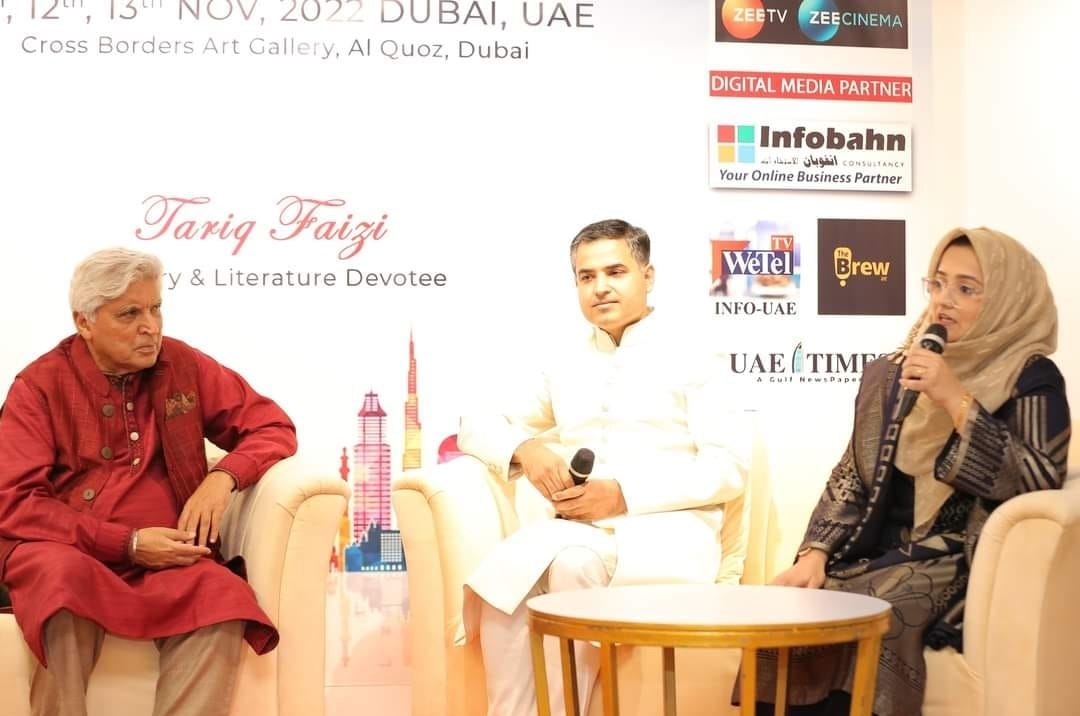Interview - Muskan Syed Riaz

Muskan Syed Riaz made her presence felt rather quickly in the literary circles of the UAE. She started her creative pursuits in English but soon realised Urdu gave her wings. Her poetry interweaves pathos, pragmatism, and spirituality. Muskaan writes under the pen name ‘Nava’, which in Persian means melody.
A resident of Sharjah, UAE, she has roots in Kali Pagdi, Amroha.
1. Do you first select a subject or a couplet and shape it as part of the creative process?
A poet always invites thoughts and tries to see everything from a poetic perspective, always trying to extract poetry from regular things. Secondly, a poet’s orientation towards and love for syntax and semantics continue to direct him in his choice of form of writing.
That being said, which subject will develop into what form – a couplet of a ghazal to be followed by more couplets in the same form to complete the ghazal or a nazm to satisfy the urge to spend more time on a single thought, is eventually decided by the subject and the language themselves; the poet is merely a medium to follow.
Even now, I feel the urge to express it like this: “Ek fann-para khud ko likhwata hai” (A poetic piece gets itself written).
2. Which was the first nazm or ghazal you recited at a mushaira?
First, thank you for this question, which took me back to the days when I had just begun to delve into and learn the fundamentals of the craft.
The first mushaira, at which I recited my poetry to a large audience from a stage, was in 2018 at Social Centre Sharjah.
And it was a tar’hi ghazal, meaning a ghazal that is written in line with another famous poet’s misra where other poets write their couplets in the same zameen meaning using the same beher (meter), qafiya (rhyming words) and radeef (a repeated word at the end of each couplet).
It so happened that a few weeks before this Mushairah, Bazm e Urdu Dubai had held a Tar’hi Ghazal Muqabla in Dubai. I was not a member of the Bazm at that time, but I had participated. The Tar’hi Misra given from Kaifi Azmi’s ghazal was “Doobengay hum zaroor magar na-khuda ke saath”
This was my ghazal:
Aaghaaz ho safar toh woh teri sanaa ke saath
Ya rab utheiN qadam toh woh teri raza ke saath
Tay keeN haiN maine raaheiN baland aasmaan ki
Naapo na tum urhaan ko meri hawa ke saath
Jaisa bhi ho urooj ho ya phir zawaal ho
Rakhey zamaana yaad hamesha dua ke saath
Aisi tamaam yaadoN ko dil se nikaal do
Waabasta hoN jo yaadeiN kisi ki jafa ke saath
Tootey naheeN haiN hausle khauf e qaza se bhi
Doobengay hum zaroor magar na khuda ke saath
Though this is one of those initial works that I no longer recite, and I have to recall the couplets as I write this down, I cherish this as an element of my journey that keeps me grounded. It is a reminder that an artist grows, improves, and matures with sincere efforts, and his work starts loving him back.
3. With its strict writing rules, Ghazal limits a poet’s imagination. Do you agree?
The strict structure of a ghazal serves the sole purpose of beautification – beautification of the language, the physical form and the thoughts it carries. It does impose limitations on the metre, the choice of words, and rhyming patterns, as well as emphasise the cohesion between the radeef and the probable qafiyas, but all of this and more ensure linguistic perfection and correct usage of idioms and proverbs.
However, it does not limit imagination. Instead, it opens an unlimited space of possibilities for versifying our thoughts. When a poet focuses on these linguistic and technical aspects, he is astonished by the possibility of expressing simple thoughts with beautiful metaphors and other poetic devices that render the verses multilayered in meaning and essence.
4. Of all the programmes you have participated in, which has been the most satisfying?
I have cherished all the programmes I have participated in, as each has taught me something valuable. From listening to the finest poetry from renowned poets to learning aspects of event organisation and experiencing the spirit of teamwork, each experience has contributed to my growth. Stepping out of my comfort zone, facing fears, and emerging successfully have been part of the journey. Some even left me with life lessons!
But if I had to name one, it would be Cultural Carwaan’s Urdu Festival of 2023, held in Abu Dhabi.
I cherish this the most for many reasons. Cultural Carwaan is headed by two of the most positive and supportive people – Dr Sabahat Asim Wasti and Syed Sarosh Asif. Their unwavering confidence in my work and their delegation of authority and flexibility have made working on their projects enjoyable and fulfilling. They are easily approachable and open to new ideas, always available to guide and help when the team needs it. Moreover, it is always a pleasure to have the company of poets like them. Their mentorship is invaluable.
Secondly, by the time this event was held, I had grown more confident and comfortable on the stage, facing the audience and handling ad hoc situations as an emcee, which enabled me to perform better. It is essential to be able to give yourself good marks.
Another cherished aspect of this event was the opportunity to meet and interact with Kamna Prasad, a renowned litterateur. Her pleasant demeanour, support, and appreciation added to the enriching experience.
The event comprised numerous segments, with the International Mushaira “Sukhanwar Bahut Achche” being a highlight. Serving as a Poet and Nazim at my first International Mushaira, where I hosted esteemed poets like Basir Sultan Kazmi, Dr Asim Wasti, and Fehmi Badayuni, is an experience I will always treasure.
5. Did you ever feel patronised by senior poets as a young female poet?
Indeed, like any other community or field, the community of Urdu poets and writers encompasses a diverse array of individuals. Unfortunately, some fit the stereotype of insecure men uncomfortable with females gaining space within their world. However, rather than allowing such forces to dominate my attention, I have focused on the community’s pleasant experiences and positive individuals. I maintain a constructive and fulfilling engagement with my passion for Urdu poetry and writing.
6. A poet is a dreamer. How difficult is it to reconcile with the natural world and its perils?
Indeed, poets often seek a space to immerse themselves in their world of dreams, where creativity reaches its peak and fine poetic pieces are born. However, despite this inclination towards their imaginative realm, poets live in the real world, and their heightened sensitivity means they are often profoundly affected by the happenings around them.
I want to share what I learned from Afeef Seraj during a conversation with him. He emphasised the importance of being able to write about subjects and issues that haven’t necessarily occurred in one’s own life yet express them genuinely and authentically. Poetry transcends mere wordcraft; it involves delving into various characters and situations through imagination, capturing them on paper as if they’ve been lived firsthand.
By this standard, it becomes a duty for a true poet to absorb even the slightest occurrences around them and create exquisite poetic pieces on such subjects. While being a dreamer is an inherent part of being a poet, being oblivious to the real world is not something to be glorified. It can hinder creativity. Therefore, remaining attuned to the realities of life while nurturing the imaginative realm is essential for a poet’s growth and expression.
7. Who is your favourite poet outside the family?
Poetry encompasses a vast universe brimming with beauty and intricacies.
Among its many forms, marsiya stands as the highest and finest. Once one has experienced the power, beauty, and profound effects of marsiya, they have genuinely experienced poetry. For me, the marsiyas of Meer Anees have been a profound source of inspiration and learning, shaping my understanding of this poetic form.
In the realm of contemporary poets, Afeef Seraj’s work greatly appeals to me. He employs a classical style, adorning thoughts with exquisite garlands of words and expressions, enriching the reader’s experience.
Regarding bravery in poetry, Dr Sarwat Zehra’s name stands out prominently. She fearlessly tackles challenging subjects, expressing them with a unique tone and style that captivates the reader. Her poetry redirects our sensibilities, inviting us to explore another dimension of life’s complexities.
8. Amroha has traditionally produced a host of good poets. How do you see your journey so far, riding on such a legacy?
In my early thirties, I delved into poetry and began reading extensively, discovering an entirely new universe awaiting exploration. Then, I realised poetry was my true calling, bringing me a profound sense of happiness.
Delving into the works of literary giants such as Jaun Elia, Rais Amrohvi, and Mushafi and engaging with contemporary poets like Azra Naqvi filled me with pride for hailing from a land that produced poets of such stature. Despite being unaware of my grandfather Syed Mehmood Hasan Qaisar Amrohvi as a child, I later uncovered his profound contributions as a dedicated academician, scholar, and poet. Reading his work was a revelation, igniting a deep appreciation for literature and poetry and fostering a sense of connection to my heritage.
The discovery was soon also followed by a feeling of missing out, which translated into this couplet:
Zindagi se mujhe ye gila reh gaya
Ik hunar mere andar daba reh gaya
Taking up poetry later in life was a consequence of excelling academically. The expectation for high-achieving students like me was often limited to pursuing careers as engineers, doctors, or securing high-paying corporate jobs. Following this trajectory, I was employed in a multinational corporation after completing my studies. I belong to a generation where Urdu was eclipsed by English in our households, nearly eradicating our mother tongue. Relearning to read and write Urdu and choosing it as a medium of expression cannot compare to the esteemed legacy of Amroha. Nevertheless, I refuse to feel guilty about not embracing Urdu as a mother tongue and a medium of creative expression. Instead, I am forging my path with passion and sincere efforts, ensuring that my daughter is fluent in her mother tongue above all else.
The decline of Urdu within our generation’s households mirrors a broader societal trend, akin to undergoing a knee replacement surgery and relearning to walk. Many of us sacrificed our mother tongue and literary legacy during the last generation for reasons beyond this discussion’s scope. Amroha, too, suffered on this front. However, I am a living example that had I discovered my true calling earlier and received earlier exposure, I could have become a successor to my grandfather’s legacy and, by extension, Amroha’s legacy.
Having relearned my stride, I hope my daughter and her children will walk further and more content, riding on this legacy with pride.
Let me acknowledge that writing constitutes a vast universe beyond complete comprehension, thus providing an infinite realm for exploration.
Lazzat e fikr meiN zabaaN se door
Hai woh takh’eel meiN bayaaN se door
Muskan Syed Riaz in conversation with Inam Abidi Amrohvi. (June 12th, 2024)

